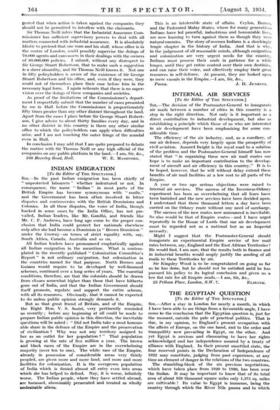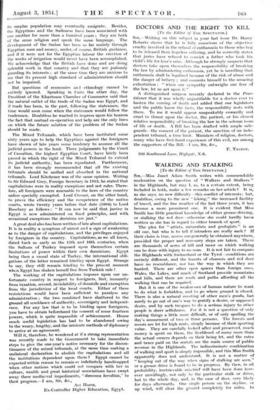THE EGYPTIAN QUESTION
[To the Editor of THE SPECTATOR.] Sm,—After a stay in London for nearly a month, in which I have been able to see things from a favourable angle, I have come so the conclusion that the Egyptian question is, just for the moment, outside the pale of practical politics. That is due, in my opinion, to England's present occupation with the affairs of Europe, on the one hand, and to the order and tranquillity now prevailing in Egypt, on the other. And yet Egypt is anxious and clamouring to have her rights acknowledged and her independence assured by a treaty of alliance with England. In their present unsettled state, the four reserved points in the Declaration of Independence of 1922 may constitute, judging from past experience, at any time an element of danger in the relations of the two countries.
The stumbling-block of the six previous negotiations, which have taken place from 1920 to 1930, has been over the Sudan. It may be important to know that of its total area of about 950 thousand square miles only 1,575 sq. miles are cultivable ! Its value to Egypt is immense, being the country through which the River Nile passes and to which its surplus population may eventually emigrate. Besides, the Egyptians and the Sudanese have been associated with one another for more than a hundred years ; they are both of the same religion and speak the same language. The development of the Sudan has been so far mainly through Egyptian men and money, under, of course, British guidance, and if it were not for the Egyptian labour the erection of the works of irrigation would never have been accomplished. We acknowledge that the British have done and are doing splendid work in that country and that they are jealously guarding its interests ; at the same time they are anxious to see that its present high standard of administration should not be impaired.
But questions of economics anl ethnology cannot be entirely ignored. Speaking in Cairo the other day, the President of the Khartoum Chamber of Commerce said that the natural outlet of the trade of the Sudan was Egypt, and if trade has been, in the past, following the statesmen, the time would soon come when the statesmen would follow the tradesmen. Doubtless he wanted to impress upon his hearers the fact that mutual co-operation and help are the only lines on which the future solution of the problem of the Sudan should be made.
The Mixed Tribunals, which have been instituted some sixty years ago to help the Egyptians against the foreigners have shown of late years some tendency to assume all the judicial powers in the land. Three judgements by the Court of Cassation, the highest Egyptian Court, have lately been passed in which the right of the Mixed Tribunal to extend its judicial authority, has been repudiated. Furthermore, it has been strongly recommended that all the existing tribunals should be unified and absorbed in the national tribonals. Lord Kitchener was of the same opinion. Writing to Sir Edward Grey, Foreign Secretary in 1913, he stated that capitulations were in reality exceptions and not rules. There- fore, all foreigners were amenable to the laws of the country unless specially exempted. Lord Cromer, on the other hand, to prove the efficiency and the competence of the native courts, wrote twenty years before that date (1894) to Lord Rosebery as follows : "It can now be said that justice in Egypt is now administered on fixed principles, and with occasional exceptions the decisions are just."
A great deal also has been written of late about capitulations. It is in reality a symptom of unrest and a sign of awakening as to the danger of capitulations, and the privileges enjoyed by foreigners in the country. Capitulations, as we all know, dated back as early as the 15th and 16th centuries, when the Sultans of Turkey imposed upon themselves certain limitations of power within their own dominions. Egypt being then a vassal state of Turkey, the international obli- gations of the latter remained binding upon Egypt Strange to say, they still remain binding to the present moment Whcn Egypt has shaken herself free from Turkish rule The working of the capitulations imposes upon our un- fortunate country in respect to foreigners, first, immunity from taxation, second, inviolability of domicile and exemption from the jurisdiction of the local courts. Either of these restrictions would have been sufficient to paralyse any administration ; the two combined have shattered to the ground all semblance of authority, sovereignty and independ- ence. For any law that is to be binding upon foreigners, you have to obtain beforehand the consent of some fourteen powers, which is quite impossible of achievement. Hence much useful legislation has had to be abandoned owing to the weary, lengthy, and the intricate methods of diplomacy to arrive at an agreement.
Will it, therefore, be wondered at if a strong representation was recently made to the Government to take immediate steps to give the one-year's notice necessary for the discon- tinuance of the mixed tribunals, at the same time making a unilateral declaration to abolish the capitulations and all the institutions dependent upon them ? Egypt cannot be expected within reason to remain so indefinitely handicapped when other nations which could not compare with her in culture, wealth and great historical associations have swept away these mediaeval impediments, "damnosa hereditas," to their progress.—I am, Sir, &c.,
ALl HAFIZ,
Ex-Controller Higher Education, Egypt.































 Previous page
Previous page